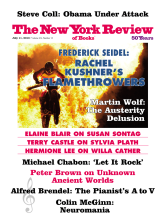In response to:
Stay Out of Syria! from the June 20, 2013 issue
To the Editors:
In his review of my piece on the Obama administration’s choices in Syria [“Stay Out of Syria!,” NYR, June 20], David Bromwich accuses me of “looking” for reasons to intervene in Syria and of being “drawn to the idea” of a military solution to the conflict. In fact, not a single word in the article offers anything remotely approaching a policy prescription. The essay examines the pros and cons of a possible American intervention in Syria, and in the course of doing so considers a number of points of view and possible scenarios. This is known as balanced journalism. Only the most willful sort of ideologue, for whom the prospect of 80,000 dead Syrians matters less than having the right political line, could read the piece and conclude anything any other than that American options in Syria are deeply sobering. If Mr. Bromwich is going to continue to stray from literary criticism and into the realm of foreign affairs, he might consider doing some reporting of his own.
Dexter Filkins
The New Yorker
New York City
David Bromwich replies:
Dexter Filkins has been a courageous and resourceful combat journalist. But his article on Syria was an attempt at political analysis: a different kind of writing. The article asked a question—should the US back rebel forces in Syria?—yet it never paused to wonder: Why are we asking this question? It offered no account of the prehistory or the aftereffects of American engagements in the Balkans and Iraq, and gave only a minimal sketch of the rival forces in Syria. It relied very heavily on conventional experts, whom it did not characterize adequately. Thus James Rubin, a partisan of intervention in Syria, is introduced as “a Clinton-era official at the State Department,” but Rubin was also an influential advocate of the Iraq war: a piece of history that matters. “Last year,” Filkins recalls, in a conspicuous first-person aside, “…I stood near the Syrian border and watched one of Assad’s gunships strafe a group of rebels.” Political analysis, too, has a use for evidence that comes from watching and testifying. But first-person narratives are not always enough; and it is not forbidden to think.
This Issue
July 11, 2013
A Pianist’s A–V
Hard on Obama
The Unbearable




